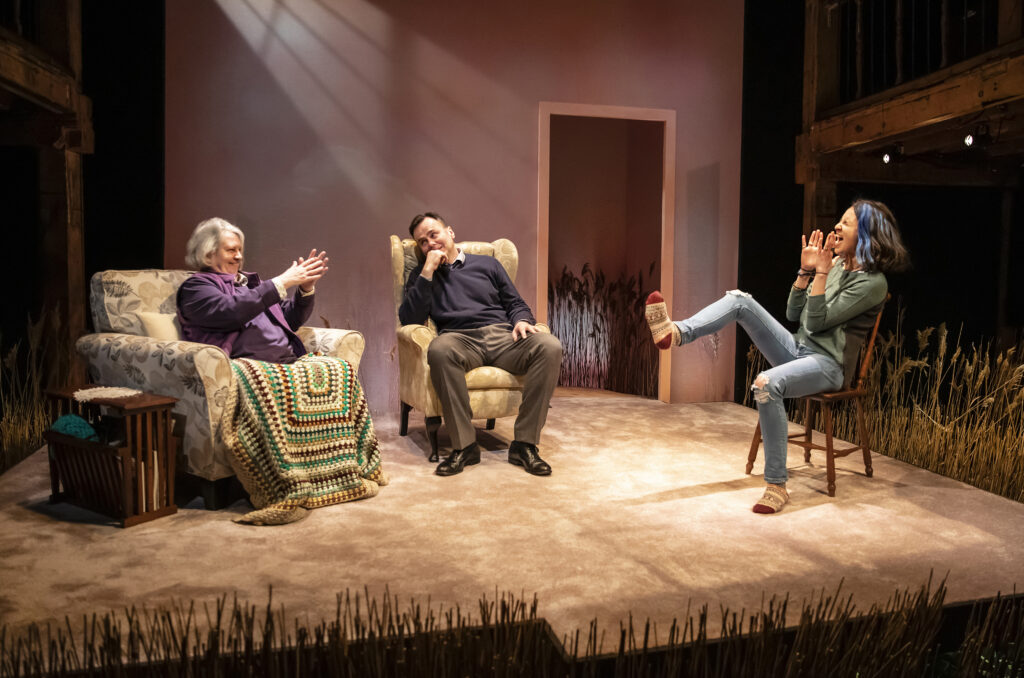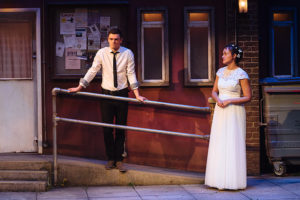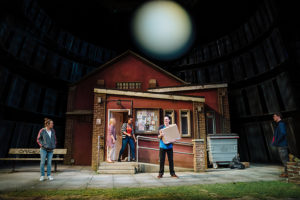Threatened theatre produces a jewel of a play
★★★★

The Arts Council has cut its annual funding to The Watermill Theatre in Newbury which will be a tragedy for UK theatre if they are no longer able to produce shows like last year’s Whistle Down The Wind, Bleak Expectations (soon to open in the West End), or their current production of Visitors.
Visitors was written by Barney Norris about ten years ago and has been revived with the author now directing. It is a sad but ultimately uplifting play about the long-lasting relationship of an elderly couple, one of whom is succumbing to dementia, contrasted with the rootlessness of newer generations. It is beautifully written, both in its construction and in its language.
After my recent visit to A Little Life where I was bombarded with blood, violence and video, it was something of a relief to be witnessing a play that relies on actors and words- pure but never simple. The Watermill has a small stage and the designers Good Teeth use it well to create a farmhouse sitting room made for two and, to the sides, a suggestion of the ripe wheat fields that were the business of the farm and now being symbolically harvested.
The occupants are Edie and Arthur, now well into their old age. In many ways, the play is a eulogy to a rural way of life that has been lost in our consumer-driven metropolitan world. They met as very young people and have adapted to each other in the same way as they have lived their lives, with a kind of make-do-and-mend. They may not have had the family or the holidays they would have liked, but they have happy memories, especially of a wedding on a beach. They have come to rely on one another and take strength from their shared experience. They talk, well Edie talks mainly, but now, as Edie puts it, her dementia has created a dam that holds back what she wants to think and say.
Barney Norris is clearly interested in the power of roots and tradition. His adaptation of Lorca’s Blood Wedding at Salisbury Playhouse in 2020 was firmly set in the community of Salisbury Plain. In Visitors, the Wiltshire farm has been in Arthur’s family for three generations, but the continuity that it, and the elderly couple who have lived there all their married life, represents is under threat. Their son Steve isn’t interested in taking over the farm and has pursued a career in insurance. A young carer, Kate, has been drafted in to help them in their old age but she is neither skilled nor certain to stay.
The restless attitude of the newer generations contrasts with the stoicism and acceptance of the older one. Steve is dissatisfied with his life and whose marriage is on the rocks. The millennial Kate is drifting aimlessly. As Edie says to her: ‘You’re unsure because you could be anyone, really, and you don’t know which life to have.’ Edie may wonder what other lives she might have led, but is content with the one she did.
If Steve and Kate are visitors to Edie and Arthur, Edie in her more lucid moments regards us all as visitors to the earth for the duration of our lives, and sees that we must make the most of it, which she fears Steve and Kate will not, given the illusion of choice that today’s rootless world offers.
As the play moves towards the inevitable closing of the door on Edie and Arthur’s life together, we learn more about all four characters.
An authentic portrait of old age
Edie is revealed to be well-read and quite a philosopher, and, in her use of language, a poet. Her brain may now be letting her down in her interactions with others but she sees the patterns of sunlight across the room and over the wheat fields, changing but eternal. Tessa Bell-Briggs as Edie seamlessly segues between warm awareness and drowning in dementia, while always retaining the sense of who she is.

Arthur is quiet and, like many men of that generation, not given to showing his emotions, which makes the moment all the more poignant when, contemplating the prospect of Edie going into a home, he breaks down in tears. Christopher Ravenscroft gives a deep performance as a shy, gentle man whose eyes twinkle with contentment and who is horrified when his lack of social skills causes him to say the wrong thing. It’s a portrayal so authentic, you feel you know him from somewhere.
Patrick Toomey plays the middle-aged, but yet to grow up, son. As we find out more about him, his initial crassness gives way to a sense that, despite his different life choices, he is like his father in his inarticulacy and social blunders.
Nathalie Barclay is Kate, the slightly on edge young woman with blue hair who finds temporary security by caring for his parents.
Despite how I have described the play, Visitors is celebratory rather than depressing. Yes, all life is temporary and usually ends badly, but Edie and Arthur have had a fulfilled life, made so by things that can’t be accounted for by economists and marketers, like tradition, love and acceptance. I thank Barney Norris for putting it on record before people like Edie and Arthur end their visit to our world and their way of life disappears forever.
Visitors is running at The Watermill until 22 April 2023. https://www.watermill.org.uk/
Paul was given a review ticket by the producer
Click here to watch this review on our YouTube channel

